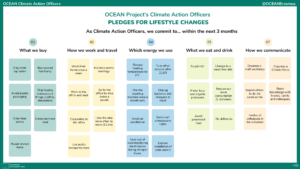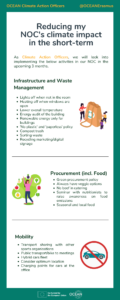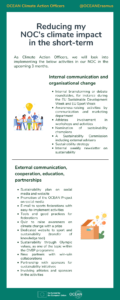On 31 May, the first online Seminar on carbon footprint measurement of the OCEAN project was held. Measuring the carbon footprint of all 18 partner NOCs is one of the key objectives of the project. The process will last until 2024 and is accompanied by the Öko-Institut that provides know-how and experience in measuring carbon footprints for sport entities.
The first Seminar focused on the preparation of the measurement. In anticipation of the Seminar, all partner NOCs filled in a questionnaire about the structure of their respective organisations (e.g., number of staff, existence of subsidiary entities). After a short introduction to the basic principles of carbon footprint measurement and the different types of greenhouse gases, the findings of this questionnaire were presented by the Öko-Institut. These findings indicate a high level of heterogeneity between the participating NOCs which is an important factor for the process of measuring the carbon footprint.

For the main part of the Seminar, the experts from Öko-Institut discussed the scope of the carbon footprint, i.e., the different kinds of sources for CO2-equivalent-emissions which are included in the calculation, with the participants. As the process of assessing an organisation’s carbon footprint and collecting data involves a consequent amount of work, the process is divided into smaller parts, namely emissions from headquarters, other locations, organisation of and participation to events and Olympic Games.
The participants engaged in an intensive and productive discussions about elements that should be considered for the measurement. As every NOC is unique, the questions also covered a variety of topics. At the end of the discussion, the project-team got an overview of all the open questions, that need to be clarified to conduct the measurement in the best and most accurate way.
This measurement process was further presented by the Öko-Institut after the first discussion. The spreadsheet for collecting a first portion of data on business travels and energy consumption had been distributed before the Seminar. NOCs used the Seminar to ask for clarifications and give feedback on the contents and the availability of the requested data within their organisations.
Next steps
Eva Rebmann (Project Manager OCEAN-project) concluded the meeting by giving an overview of next steps within the project regarding the carbon footprint measurement as well as the training course for Climate Action Officers.
The training course will continue online in October 2023, before Module 3 of the Training Course for Climate Action Officers takes place at the IOC and ANOC Headquarters in Lausanne in Spring 2024.
In the meantime, the data collection for the 18 partner NOCs’ carbon footprint measurement will continue before the first results can be analysed in 2024.
The OCEAN Management Team congratulates all 18 Climate Action Officers for their commitment to making our sport more sustainable!
Following the first Module that took place in February in Brussels,, the 18 Climate Action Officers attended the second Module of the ‘Climate Action in Sport’ Training Course of the OCEAN Project online, which focused on their role and empowerment within their respective organisations.
During the first session, the Climate Action Officers received feedback and advice from experienced sustainability officers in charge of the green transition of their sports organisations.
Among them:
🔹 Bianca Quardokus, Sport Facilities, Environment and Sustainability Officer at the German Olympic Sports Confederation (DOSB);
🔹 Trine Keinicke Sørensen and Lasse Lyck from the NOC and Sports Confederation of Denmark (DIF);
🔹 Marleen Wielemaker, Programme Manager Sustainability at the Dutch Olympic Committee*Dutch Sports Federation (NOC*NSF);
🔹 Warwick Waters, Head of Advocacy and Stakeholders Engagement at the Australian Olympic Committee (AOC);
🔹 Riikka Rakic, Head of Sustainability at the International Biathlon Union (IBU);
🔹 Jamie McKeown, Sustainability, Diversity & Inclusion Manager at World Rugby.
In a panel discussion, the speakers first presented their academic and professional backgrounds and then addressed various topics relevant to the successful completion of their missions as Climate Action Officers, such as: staff and board engagement, dedicated budget for sustainability/climate, internal and external communication, and tips for accurate carbon footprint measurement.
Based on this feedback and their personal experience, the participants were able to draw up a detailed description of the role of the Climate Action Officers in working groups (see here). To conclude, participants had the opportunity to share the first actions they implemented within their NOCs since the end of Module 1 of the OCEAN project, based on the pledges made while in Brussels (see here).
The second session was led by Matthew Campelli, Sustainability Director of Touchline and seasoned consultant on sustainability for sport organisations. In a session on the do’s and don’ts of strategic communication on sustainability, Climate Actions Officers discussed in groups the right approach to internal and external stakeholders of the NOCs, whose engagement in climate action is necessary for a credible carbon footprint reduction strategy. Participants were also asked to draft a concrete communication plan for their NOC in the framework of the OCEAN project.
The third and last session was dedicated to staff engagement and empowerment activities, with general tips as to how to build and carry messages to convince internal stakeholders to engage in climate action. This was followed by an experience-sharing on concrete activities that can be implemented within the organisation.
🔹 Lise Van Long, Sustainability Manager at the International Olympic Committee (IOC) gave an overview of the IOC Sustainability Strategy implemented since 2017, and then presented some concrete activities put in place to engage IOC staff and board members (e.g. Green Week, carbon budget for travelling).
Partner NOCs (especially NOC Denmark, NOC Bosnia and Herzegovina, NOC Romania and NOC Slovakia) then presented the in-house trainings and presentations already done with their staff and directors since the beginning of the project.
Module 3 of the Training Course for Climate Action Officers will take place at the IOC and ANOC Headquarters in Lausanne in Spring 2024. Until then, the carbon footprint measurement process will start with the data collection and Seminars provided by the Öko-Institut to support Climate Action Officers.
The OCEAN Management Team congratulates all 18 Climate Action Officers for their commitment to making our sport more sustainable!
Following the Kick-off meeting, the 18 Climate Action Officers attended their first session of the ‘Climate Action in Sport’ Training Course of the OCEAN Project in Brussels.
For two days, the Climate Action Officers participated in interactive workshops on climate change and sport, and heard presentations from speakers engaged in the green transition of sport.
🔹 Tobias Wagner, Researcher at the Öko-Institut, introduced the German National Olympic Committee’s carbon footprint measurement process and offered an introductive course to climate change.
🔹 Isabelle Jean, Director of the Mobilisation Unit at WWF France, presented the study "Climate change: The world of sports at +2°C and +4°C" and showed how sports practices and infrastructure are and will be impacted by climate change.
🔹 Julie Duffus, Sustainability Senior Manager at the International Olympic Committee (IOC), presented IOC’s climate reduction plan as well as the United Nations Sports for Climate Action Framework as a practical way for National Olympic Committees (NOC) to engage more towards sustainability. She also focused on the importance of NOCs leadership’s commitment and the necessity to determine the scope of actions as the two main first steps of any strategic approach to sustainability.
🔹 Fabrizio D'Angelo, Sustainability Manager at the IOC, presented the IOC’s carbon footprint and provided some guidance on NOCs carbon footprint measurement, based on the GHG Protocol Standard and the3 scopes system.
As part of the interactive workshops, Climate Action Officers took part in the “Climate Fresk”, a participative game facilitated by the EOC EU Office, and worked together in groups on concrete actions that they could implement as individuals, as well as NOCs. The following questions were tackled: what needs to be done, and can how NOCs proceed?
These collaborative sessions led to very promising pledges and ideas of action at both individual and organisational levels. To know more, please see the figures below.
The Training Course will be organised in 5 modules between now and the end of the carbon footprint measurement process in December 2024.
Module 2 of the Training Course for Climate Action Officers will take place online from the 18th to the 21st of April 2023.
The OCEAN Management Team congratulates all 18 Climate Action Officers for their commitment to making our sport more sustainable!



